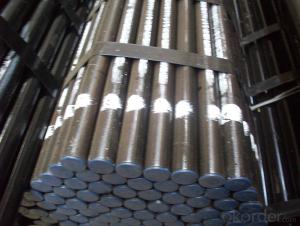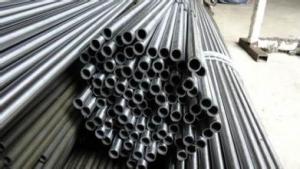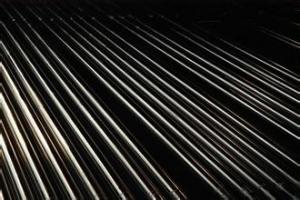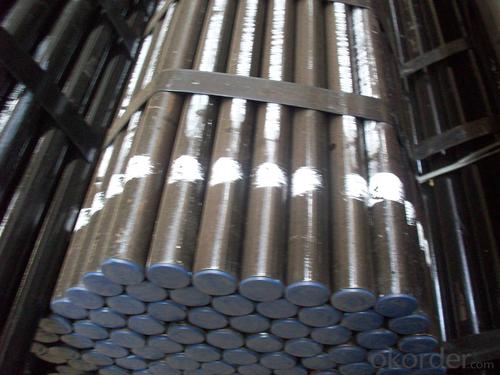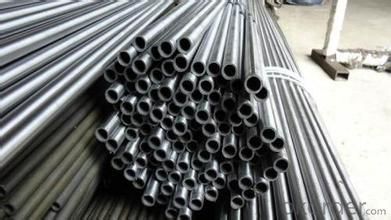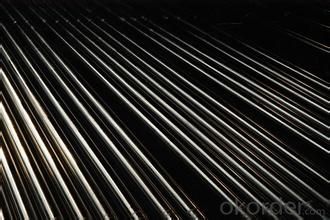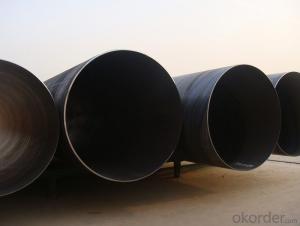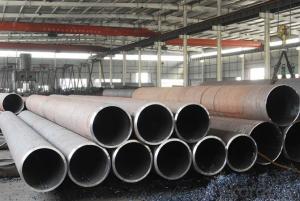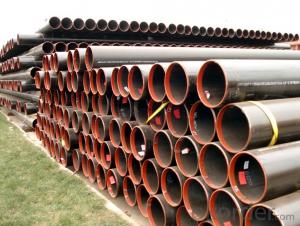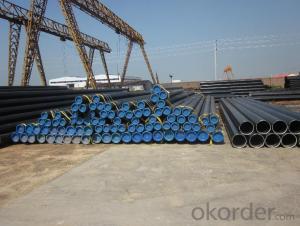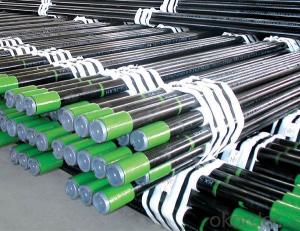API Carbon Seamless Hot Sale Steel Pipes
- Loading Port:
- China main port
- Payment Terms:
- TT or LC
- Min Order Qty:
- 100 m.t.
- Supply Capability:
- 10000 m.t./month
OKorder Service Pledge
OKorder Financial Service
You Might Also Like
Hot rolled seamless steel pipes
1) Standard: API Standard:ASTM A106.ASTM A53,ASTM A135,ASTM A179,ASTM A214,ASTM A192,ASTM A226,ASTM A315,ASTM A178,ASTM A210,ASTM A333,ASTM A355,ASTM A369,ASTM A334 ASTM/ASME A312/SA312, ASTM/ASME A213/SA213, ASTM A269,ASTM 511,API5L,API5CT, GOST 9940,GOST 9941,JIS G 3459, JIS GS3463, GS3467, JIS G3448, DIN EN 10216-2006(DIN 17458) , DIN EN 10297-2006(DIN 17456) etc.
2) Steel Grade: ASTM A106 GRB,A53 GRB. API 5L GRB,API 5 CT N80,K55,A335 P11.P91,DIN ST52,ST44,ST35.8,ST37,ST42,ST45
3)Outside Diameter:1/2"-20" Or 21.3-508mm
4) Wall Thickness: 3-40mm
5) Application: The products are widely used in fertilizer, petroleum, central-station, boiler, power station, shipping military, chemical industry, environment protection, traffic, metallurgy and mine, printing and dyeing, food industry, medical equipment, and so on.
Production Equipment :
30 sets of Cold-drawn Machinery (Model: 3 ton to 500 ton)
Cold-rolled Machinery: Model LD-30, LD-60, LG-90H (L), LG-159H (L)
Automatic Roller Solution & Annealing Heat Treatment Equipment
18-meter-long Pickling Sin
QUALITY ASSURANCE:
1) Strictly acc. ASTM,DIN,JIS,EN,GOST etc
2) Sample: We are accept your sample requirement
3) Test: Eddy current / hydrostatic/ Ultrasonic/ Intergranular Corrosion or according to customers' request
3) Certificate:API, CE ,ISO9001.2000.MTC etc
Main Features of the Seamless Pipe :
• High manufacturing accuracy
• High strength
• Small inertia resistance
• Strong heat dissipation ability
• Good visual effect
• Reasonable price
Packaging & Delivery
Packaging Details: | seaworthy package,bundles wrapped with strong steel strip |
Delivery Detail: | 15-30days after received 30%TT |
FAQ of Seamless Pipe :
①How is the quality of your products?
Our products are manufactured strictly according to national and internaional standard, and we take a test on every pipe before delivered out. If you want see our quality certifications and all kinds of testing report, please just ask us for it.
Guaranteed: If products’ quality don’t accord to discription as we give or the promise before you place order, we promise 100% refund.
②How about price?
Yes, we are factory and be able to give you lowest price below market one, and we have a policy that “ for saving time and absolutely honest business attitude, we quote as lowest as possible for any customer, and discount can be given according to quantity”,if you like bargain and factory price is not low enough as you think, just don’t waste your time.Please trust the quotation we would give you, it is professional one.
③Why should you chose us?
Chose happens because of quality, then price, We can give you both.Additionally, we can also offer professional products inquiry, products knowledge train(for agents), smooth goods delivery, exellent customer solution proposals.Our service formula: good quality+good price+good service=customer’s trust
SGS test is available, customer inspection before shipping is welcome, third party inspection is no problem.
Any question, pls feel free to contact us !
Seamless Pipe ASTM A106/53 Images:
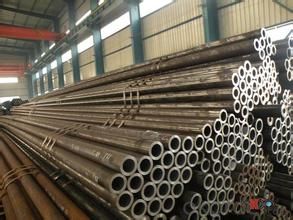
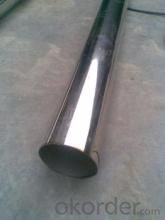
4) Inspection: BV,SGS,others is avaliable.
- Q: Does seamless steel tube have a bend of 135 degrees?
- Other name: 90 degree elbow, right angle bend, love bend, punching elbow, pressing elbow, mechanism bend, welding elbow, etc..Usage: connect two pipes with same nominal diameter or different pipe, make the pipe bend at 90, 45, 180 degrees and various degrees.Bending radius is less than or equal to 1.5 times the diameter of the elbow. It is 1.5 times larger than the pipe diameter and belongs to the elbow
- Q: What are the different coating materials used for steel pipes?
- Some common coating materials used for steel pipes include epoxy, polyethylene, polyurethane, and coal tar enamel. These coatings are applied to protect the steel from corrosion and provide a barrier against environmental elements.
- Q: What is the difference between hot-dip galvanizing and electroplating of steel pipes?
- Steel pipes can be protected from corrosion using two different methods: hot-dip galvanizing and electroplating. To protect steel pipes using hot-dip galvanizing, they are immersed in a molten bath of zinc. The zinc reacts with the steel to create a strong and uniform coating that effectively prevents corrosion. This method is commonly used for outdoor applications and in harsh environments where the pipes are exposed to water or chemicals. In contrast, electroplating involves depositing a thin layer of metal, usually zinc, onto the surface of the steel pipes using an electric current. The steel pipes act as the cathode, and a zinc anode is placed in a solution containing zinc ions. The electric current causes the zinc ions to react with the steel and form a thin coating. Electroplating is often chosen for indoor applications or when aesthetics are a priority. Hot-dip galvanizing generally provides a thicker and more durable coating compared to electroplating. The hot-dip galvanized coating is several times thicker than the electroplated zinc coating, offering better corrosion protection and a longer lifespan for the pipes. The appearance of the coatings also differs. Hot-dip galvanizing results in a matte gray finish, while electroplating can give a more lustrous and shiny appearance. Cost-wise, hot-dip galvanizing is more cost-effective for larger projects because it can coat multiple pipes simultaneously. On the other hand, electroplating is usually more expensive and time-consuming, especially for larger quantities of steel pipes. Ultimately, the choice between hot-dip galvanizing and electroplating depends on the specific requirements of the project, including the intended application, environment, aesthetics, and budget constraints.
- Q: Can steel pipes be used for conveying gases?
- Yes, steel pipes can be used for conveying gases. Steel pipes are commonly used in various industries, including oil and gas, petrochemical, and construction, for transporting various types of gases such as natural gas, air, and hydrogen. Steel pipes offer several advantages for gas transportation. They are strong and durable, able to withstand high pressure and temperature conditions. Steel pipes also have excellent resistance to corrosion and can effectively prevent gas leakage, ensuring the safety and reliability of the gas transportation system. Additionally, steel pipes have a smooth internal surface, which minimizes the frictional resistance and allows for efficient gas flow. Overall, steel pipes are a reliable and widely-used option for conveying gases in various applications.
- Q: What are the different types of steel pipe bends?
- There are several types of steel pipe bends, including long radius bends, short radius bends, and induction bends. Long radius bends have a larger radius and are used when a gentle bend is required. Short radius bends have a smaller radius and are used when a more abrupt bend is needed. Induction bends are created using a heating process to achieve specific bend angles and radii.
- Q: What are the different wall thicknesses available for steel pipes?
- There are various wall thicknesses available for steel pipes, depending on the specific requirements and applications. Steel pipes come in different schedules, which indicate the wall thickness. The most common wall thicknesses for steel pipes are Schedule 40, Schedule 80, and Schedule 160. Schedule 40 steel pipes have a relatively medium wall thickness and are commonly used for general-purpose applications, such as conveying fluids and gases. They are suitable for low-pressure systems and are widely used in plumbing, HVAC, and irrigation systems. Schedule 80 steel pipes have a thicker wall compared to Schedule 40 pipes and are designed for high-pressure applications. They are commonly used in industrial settings, oil and gas pipelines, and high-pressure fluid transport systems. The increased wall thickness provides higher strength and durability to withstand the pressure. Schedule 160 steel pipes have the thickest wall among the commonly available options. They are designed for extremely high-pressure applications, such as in refineries, chemical plants, and power generation facilities. These pipes provide exceptional strength and can handle the intense pressure and stress found in these industrial environments. Apart from these standard schedules, there are also other wall thicknesses available for specific purposes. For example, extra-strong (XS) pipes have a thicker wall than Schedule 80 pipes and are used for applications that require even higher pressure resistance. It is important to consult with professionals or refer to industry standards to determine the appropriate wall thickness for a specific application. Factors such as fluid or gas pressure, temperature, and environmental conditions should be considered when selecting the appropriate steel pipe with the desired wall thickness.
- Q: What are the common applications of steel pipes?
- Steel pipes have a wide range of common applications in various industries including oil and gas transportation, plumbing systems, structural support in construction, irrigation systems, and industrial processes such as water and wastewater treatment.
- Q: How seamless steel tube is formed?
- Hot drawing or cold drawing. The so-called cold is the billet from the thick wall tube is not heated, oil lubrication, with a steel sleeve inside, gradually elongated. Hot drawing is to make the billet tube red, do such work, generally thick wall applicable.
- Q: How do you calculate the pipe thermal expansion coefficient for steel pipes?
- The pipe thermal expansion coefficient for steel pipes can be calculated using the formula: α = (L2 - L1) / (L1 * (T2 - T1)) Where: α is the pipe thermal expansion coefficient L1 is the initial length of the pipe L2 is the final length of the pipe T1 is the initial temperature of the pipe T2 is the final temperature of the pipe. This formula takes into account the change in length and the change in temperature to determine the coefficient of thermal expansion for steel pipes.
- Q: How are steel pipes used in sewage systems?
- Steel pipes are commonly used in sewage systems for their strength, durability, and resistance to corrosion. These pipes are used to transport sewage and wastewater from homes, businesses, and industrial facilities to treatment plants or disposal sites. They are ideal for underground installations due to their ability to withstand high pressure and the weight of the surrounding soil. Additionally, steel pipes can be welded together, providing a seamless and leak-proof system that ensures the safe and efficient transportation of sewage.
Send your message to us
API Carbon Seamless Hot Sale Steel Pipes
- Loading Port:
- China main port
- Payment Terms:
- TT or LC
- Min Order Qty:
- 100 m.t.
- Supply Capability:
- 10000 m.t./month
OKorder Service Pledge
OKorder Financial Service
Similar products
Hot products
Hot Searches
Related keywords
